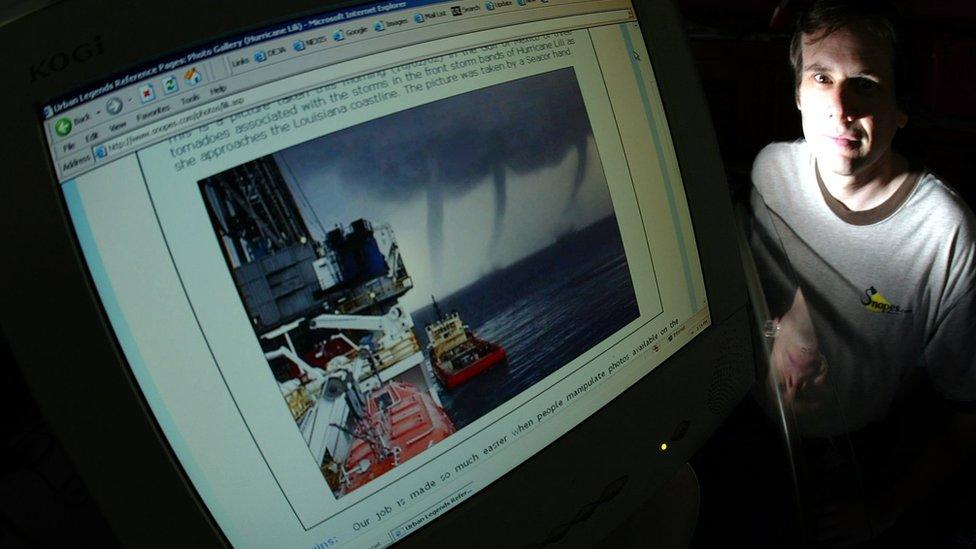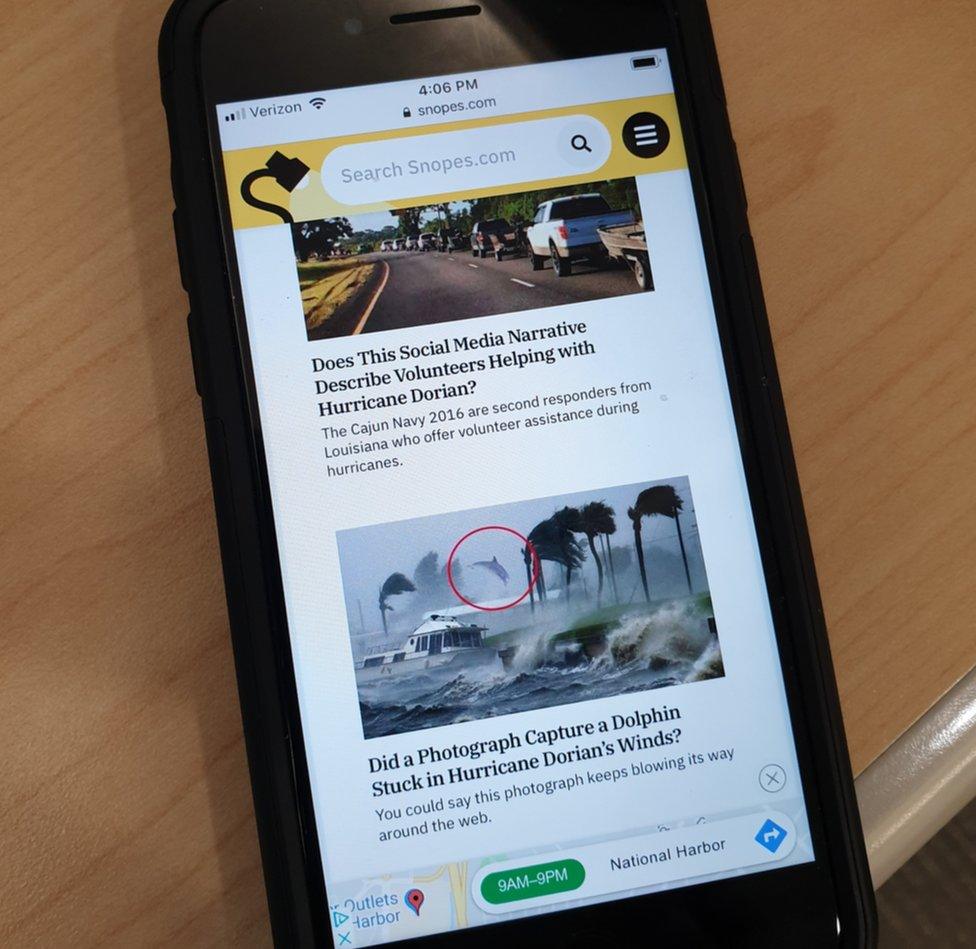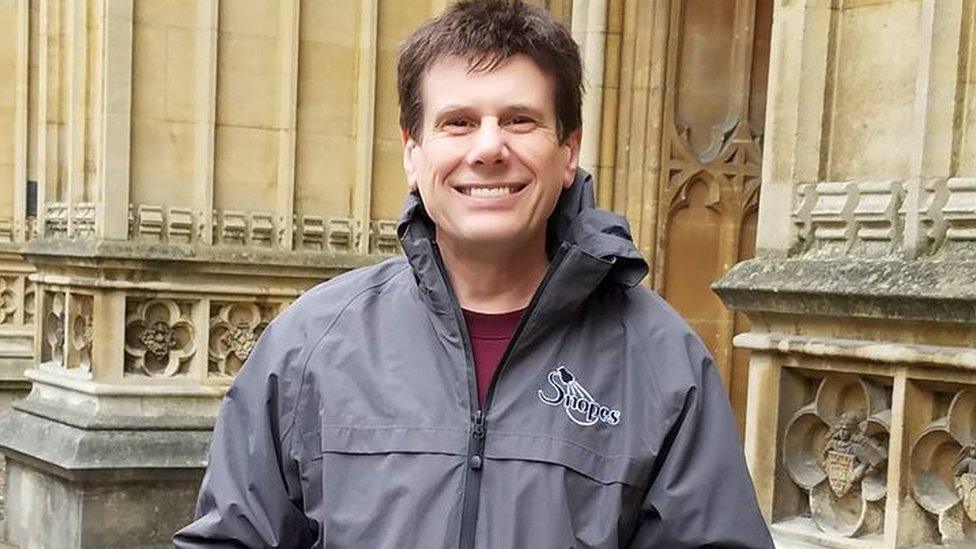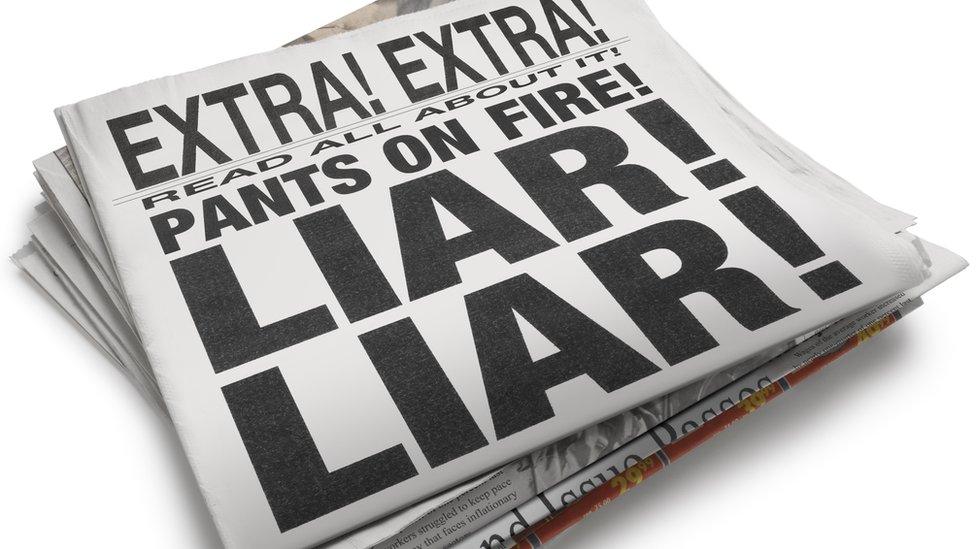Snopes: How do you survive 25 years debunking fake news?
- Published

David Mikkelson by his computer monitor with a doctored photo in the early days of Snopes
How do you survive 25 years in the fact-checking business?
Snopes began as a forum for sharing and investigating urban legends and cool folklore.
But in a world where "fake news" dominates, where disinformation is a part of the political sphere and misinformation touches every single corner of the internet, what is it about this online encyclopaedia which has made it become the go-to bible for many fact-checkers?
And how is it evolving to deal with the current landscape?
The Snopes website and social feeds have become a reservoir of bizarre facts, political nuggets, investigative journalism into hard-hitting subjects - as well as the most weird stories you can imagine.
From questions around President Donald Trump's tweeted policy suggestions to queries around Disney's Goofy and whether he is actually a cow, there seems to be very little that the fact-checkers haven't had to cast a sceptical eye over.
News events keep the trending list of top 50 rumours current with a question over the veracity of images, external emerging as a result of Hurricane Dorian popping up. But often older debunks turn up again and again such as ones focusing on a story about 'dangerous cosmic rays passing close by the earth' and viral 'deathbed warnings' by Apple co-founder Steve Jobs.
David Mikkelson, the co-founder of Snopes, says: "People come to look up things they've encountered on the internet and find out whether they are true or not.

Snopes looks at a wide manner of stories

"We're hoping that the site doesn't end up like this permanently but that's the niche we're in right now. We're like a number of other sites that fact-check mostly political items. But we still look at the sort of odd things people post on Facebook and elsewhere and examine the sorts of urban legends we started out with years ago."
Of course there are regular debunks his team come across again and again. Mr Mikkelson says: "There are certain stories that never go away. There's a note that says if you are using an ATM and someone pulls out a gun on you, then if you enter your PIN (personal identity number) in reverse it will summon the police. That comes back again and again.
"And there's that message that is always circulating on Facebook that states that Facebook is about to make all your private messages public or urging people to assert copyright over everything they have ever posted. It doesn't matter how long ago these rumours started or how frequently they've been debunked - they come back time and time again."
Mr Mikkelson, who is based in Tacoma, Washington, says that he's no longer surprised by the variety of topics that his team of 15 spread out across the country now end up covering but they do have rules about what they will cover.
"The standards we use for fact-checking are about going after what most people are questioning or asking about.
"We don't make any judgments about what's too silly or obvious or frivolous or not important enough."
However he added that sometimes he found it disconcerting what the audience considered to be important and how it was sometimes very different to what his team would consider reporting.
"There may be rumours of a chemical attack against civilians in Syria and all sorts of rumours about whether that happened and who was involved. There are questions around did the government do it; was it an outside force etc and that doesn't get much interest.
"But then you might have a ridiculous story about something like a woman giving birth in an elevator and it gets millions of views."
He said the team got their ideas from a variety of sources from emails to queries posted on Facebook to tools showing them what was trending across Google, Twitter and Reddit.
Some articles could take just several minutes to pull together and stamped as "fake" as the source from which they came would be a site known for pumping out misinformation.
"Other things can take days or weeks and we have to track down stories, locate various experts, wait for people to get back to us or in extreme cases try to get access to records using tools like the Freedom of Information Act."
The site has a section dedicated to debunking fake images - describing it as fauxtography - and most recently, it's come out stating that it's trying to avoid using the term 'fake news' with Mr Mikkelson preferring to use the label 'junk news' instead, external. In August, Snopes revealed a new rating system including identifying content which its creators have described as satire.
In a note published on the Snopes site, Mikkelson states that it's important to cover humour and satire and highlight the viral stories that fall under this label - such as a dog pictured with a slice of ham, external on its face with a note stating it had been badly burned.
"Our mission is to service that audience as best we can by providing them with accurate and helpful information. It's not our job to disparage them for being confused by something that appears ridiculous to others, or to disdain them because it's their "own fault" for misunderstanding the "obvious," or to ignore them because they're puzzled by something that wasn't deliberately created to fool them."

David Mikkelson believes Snopes will continue to have a future
While Snopes remains a valuable resource for fact-checkers - it has more than 235,000 followers on Twitter and 690,000 followers on Facebook alone - it has had a bumpy few years.
Snopes pulled out of a fact-checking partnership with Facebook earlier this year, choosing not to renew its contract.
Mr Mikkelson had co-founded Snopes with his then wife Barbara. The couple divorced and Barbara sold her share of Snopes' parent company Bardev Inc to five individuals in 2016 who at that point were all associated with a company called Proper Media. But Mr Mikkelson is now locked in a litigation battle, external with a number of ex-business associates from the company regarding the commercial interests of the site with numerous court dates called.
Snopes has been fundraising for money to help with its costs.
While Mr Mikkelson is optimistic that Snopes will survive, he says that he doesn't know exactly what the site's future will look like until the dispute is resolved.
The site also comes under attack over the stories it covers and is regularly accused of being biased but Mr Mikkelson states this is "an occupational hazard" when a company is involved in fact-checking: "It doesn't matter how impartial you were, there is always some subset of the audience that is determined to believe what they want to believe."
"We're an element of pop culture now and we're a vital part of the journalistic world. But we're also a business with multiple employees now and it's a very different challenge to be heading up a business to operating a hobby site.
"We've lasted this long and it's a pretty good bet that we are resourceful. We are always going to be here one way or another."
- Published25 July 2017

- Published2 February 2019
- Published14 July 2017
